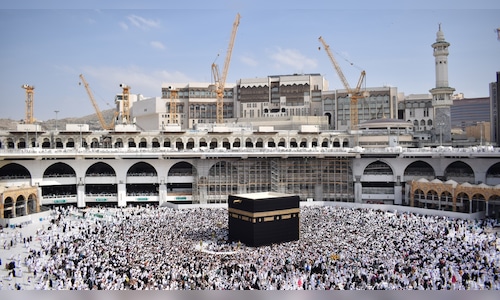This represents a doubling of enforcement from 2024, as the kingdom aims to avoid a recurrence of the mass fatalities witnessed last June, when temperatures soared to a two-decade high of around 52 degrees Celsius (126F). The majority of those who died were unregistered pilgrims lacking proper shelter, according to the Saudi authorities.
“That’s why we have implemented stricter regulations to ensure that only permit holders can attend Hajj,” stated Tawfig Alrabiah, the Minister of Hajj and Umrah, in an interview.
Also read | Hajj 2025: Second batch of pilgrims departs from Srinagar for Mecca
The number of fatalities in 2024 was only surpassed by stampedes in 1990 and 2015, underscoring the challenges of safeguarding Hajj pilgrims who may walk up to 65 kilometers (40 miles) during the five-day event. Although Hajj is set to shift to cooler months in the near future, this year’s season begins in June, during which Saudi temperatures are anticipated to reach up to 47 degrees Celsius (117F).
Promoting religious tourism has become a priority for Saudi Arabia, as it seeks to enhance the pilgrim experience and diversify income sources. The Hajj economy is projected to triple in worth, reaching approximately $350 billion by 2034, according to the research firm Future Market Insights Inc.
To accommodate the expanding market, the kingdom aims to boost its capacity to welcome more pilgrims by 2030 but now faces the critical challenge of balancing these ambitions with the realities of climate change.
As Saudi authorities explore options for Hajj security, they are focusing on crowd management. Alrabiah noted that Hajj quotas would remain fixed and limited, countering reports suggesting a possible increase to six million by 2030. “We don’t want to jeopardize people’s lives by increasing the numbers.”
Also read | Saudi Arabia to welcome an additional 10,000 Hajj pilgrims from India, according to the Ministry of Minority Affairs
Saudi Arabia also plans to elevate Umrah visits to 30 million by 2030, up from approximately 17 million in 2024. Unlike Hajj, which occurs at a specified time, Umrah can be performed year-round.
“It will be hot, and it won’t be an easy experience. Remember, we’ll be about 20 women sharing a room,” she said. “It’s not a vacation, so that’s alright.”
Individuals attempting the pilgrimage without proper permits will lack access to air-conditioned tents or transportation, placing them at a greater risk for health issues. Last year, Saudi Arabia reported treating 141,000 unauthorized pilgrims during the heat wave.
Consequently, hospital bed capacity has been expanded by 60% compared to 2024. More than 1 million foreign Hajj pilgrims have already arrived in Saudi Arabia for this year’s journey.
Authorities will continue efforts to mitigate heat exposure with shaded walkways, misters, and improved water access, and have upgraded road cooling technologies since last year. Experts argue that while these initiatives aim to reduce heat-related risks, they may not keep pace with rising temperatures.
Saudi Arabia’s Alrabiah confirmed ongoing improvements and reiterated that crowd management remains a paramount focus.
“You won’t find such a vast crowd moving together anywhere else in the world.”



